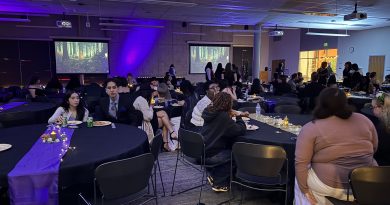Protests & Expressing Your Opinion
By: Alexa Monet Valdez
As protests continue to spark heated debates at university campuses across the country, President Donald Trump is now threatening students, raising concerns about freedom of speech and freedom of assembly.
On Tuesday, President Trump made a comment on Truth Details, in which he wrote “All Federal Funding will STOP for any College, School, or University that allows illegal protests. Agitators will be imprisoned/or permanently sent back to the country from which they came. American students will be permanently expelled or, depending on the crime, arrested. NO MASKS! Thank you for your attention to this matter.”
James Sinding, Associate Director, Campus Safety and Transportation Operations and other professionals at the University of Washington Tacoma weighed in on the implications of Trump’s comments for students at UWT.
Sinding spoke directly to the university’s commitment to protecting students if they choose to protest on campus.
“If an officer sees something that is of interest, they will approach it in a manner of gathering information in an understanding manner and will call additional officers if needed to assess the issue,” Sinding said.
He reassured that the university is committed to ensuring that students are aware of their rights. He added that the UWT officers have been made aware of possible issues and available to answer questions.
Experts at UWT acknowledge that students have the ability to advocate for change, voice their opinions, and challenge injustice.
“College students have the right to protest in public spaces on college campuses the same way that adults have a right to protest in public spaces,” said Chris Demaske, Communications Professor and an expert in the First Amendment Law.
According to the U.S. Constitution, the First Amendment Law represents and states “Congress shall make no law respecting an establishment of religion, or prohibiting the free exercise therefore; or abridging the freedom of speech, or of the press; or the right of the people peaceably to assemble, and to petition the Government for a redress of grievances.”
“If we remove that, we remove our ability to have a meaningful conversation,” Demaske said.
While students are free to share their voice and protest, there are restrictions put into place to ensure that individuals expressing their opinion does not disrupt campus life.
The UWT’s guidelines for protest are available stated in the Washington Administrative Code: “Freedom of expression is a highly valued and indispensable quality of university life. However, university facilities may not be used in ways which obstruct or disrupt university operations, the freedom of movement, or any other lawful activities. Additionally, use of university facilities may be subject to reasonable time, place and manner restrictions.”
The Vice President of Associated Students of UWT, Moira Kelley, a business management major, also spoke to the commitment for students to speak on campus.
“We will be seeing a trickle down effect of the changes being made federally to our campus. I think students need to remember that the administration learns about the decisions at the same time students do, and that they are working towards creating a safety barrier. ASUWT’s purpose is to advocate and support UWT students and this will not stop,” Kelley said.
It is essential that students are safe and have the ability to exchange ideas and opinions on campus. The UWT is firmly committed to supporting and legally bound to permit speech that falls under protected expression.
The UWT offers students a resource page if you want to know more about your rights and responsibilities when protesting on their official website; https://www.tacoma.uw.edu/fa/safety/administrative-policies-procedures#permalink-20872.





